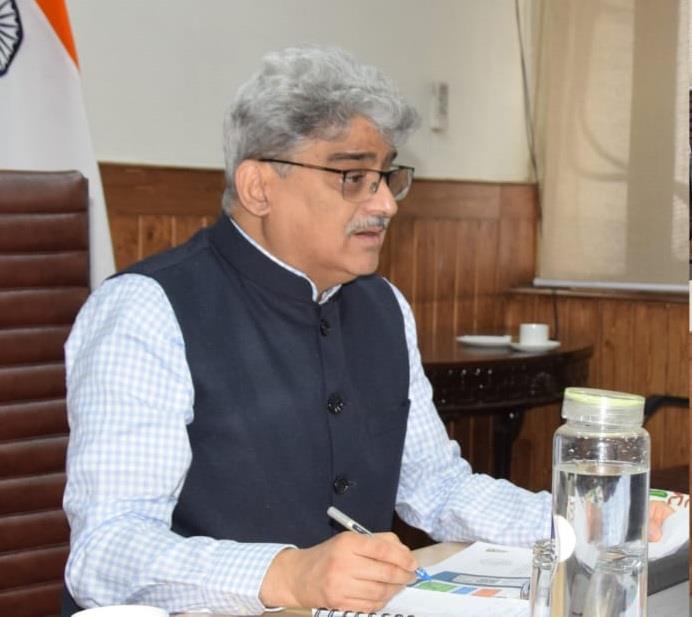Chief Secretary discusses industry-driven ‘Hub & Spoke Model' for ITI modernization with stakeholders

Jul 01, 2025
JAMMU: In a significant move aimed at transforming the skilling ecosystem of Jammu and Kashmir, Chief Secretary Atal Dulloo today chaired a high-level meeting with key government functionaries and prominent industry representatives to deliberate on implementation of the Government of India's flagship scheme for modernization of Industrial Training Institutes (ITIs) through a hub and spoke model.
The meeting witnessed participation from Additional Chief Secretary, Higher Education; Principal Secretary, Finance; CMD, J&K Bank; Commissioner Secretary, Industries & Commerce; Secretary, Skill Development Department (SDD); Director General, Budget; Directors of SDD and I&C (Jammu/Kashmir) and senior representatives from leading public and private sector enterprises including SIDBI, NHPC, TCS, IOCL, HPCL, BPCL, CVVPL, NHAI and others.
The deliberations revolved around the ways and means of implementing the newly launched Centrally Sponsored Scheme titled ‘National Scheme for ITI Upgradation and Setting up of National Centres of Excellence (NCOE) for Skilling', which carries a massive outlay of ₹60,000 crore, comprising Central share of ₹30,000 crore, State share of ₹20,000 crore and Industry/CSR contribution of ₹10,000 crore.
Addressing the participants, the Chief Secretary emphasized that the success of this ambitious skilling initiative hinges on a robust public-private partnership. He sought candid inputs from all participants on how best to implement the scheme in the UT to ensure that the youth of J&K are trained with market-relevant skills that make them employable and industry-ready.
He called upon the industry stakeholders to actively adopt and take ownership of hub-and-spoke clusters by aligning them with real-time industrial demands. "You can play a pivotal role not only in shaping the curriculum and upgrading infrastructure but also in nurturing these institutions on professional lines," he told the industry leaders, urging them to sign MoUs for formalizing their commitment under the scheme.
Dulloo further instructed the Skill Development Department to explore potential partnerships with leading PSUs and industrial conglomerates across the country, tapping into their CSR initiatives and technological expertise.
Speaking during the meeting, ACS, Higher Education, Shantmanu encouraged the stakeholders not to be deterred by challenges. He urged for innovative engagement models and suggested leveraging every possible channel for training, mentoring, and eventual placement of youth over time.
Principal Secretary, Finance, echoed similar sentiments and proposed organizing a high-level workshop with national PSUs and corporate houses in Delhi to showcase the opportunities and mutual benefits of investing in J&K's skilling ecosystem. He also recommended benchmarking against successful ITI models in Delhi, Mumbai, and Gujarat that have achieved 100% placement records in recent years.
Commissioner Secretary, I&C, Vikramjit Singh, suggested exploring models where industry-aligned groups could be entrusted with the day-to-day running of ITIs, thereby ensuring hands-on training and direct linkages to employment.
Secretary, SDD, Kumar Rajeev Ranjan, presented the framework of the scheme, highlighting its dual focus-modernizing 1,000 Government ITIs under a hub and spoke system with revamped industry-aligned trades and establishing five National Centres of Excellence for Skilling at select National Skill Training Institutes (NSTIs).
He informed that select well-performing ITIs in J&K would be designated as hubs, while nearby institutes would be developed as spokes, each cluster supported by specific industrial partners. These partners are expected to provide managerial support, help in co-designing the course curriculum, depute expert trainers, provide modern machinery and equipment, and conduct specialized training for instructors.
Further, the industrial partners are mandated to facilitate On-the-Job Training (OJT) and support real-world exposure of trainees, thereby bridging the critical gap between classroom learning and practical industry needs. Each hub is proposed to receive ₹80 crore and each spoke ₹40 crore over five years, with the financial contribution shared in a 50:30:10 ratio by the Centre, State/UT and Industry respectively.